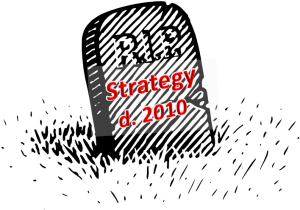 An article in yesterday’s Wall Street Journal announced, “strategic plans lose favor” in the current economic environment. Executives, it reported, were adopting “just-in-time” decision-making according to a partner at McKinsey & Co. There is no longer time to “predict the future” and, anyway, the future was too uncertain. Now, quick adaptation and decisions were needed. Amazingly, some companies had even created “situation rooms” to monitor current events to support quicker decisions. An Accenture manager summarized by saying, “strategy, as we knew it, is dead.”
An article in yesterday’s Wall Street Journal announced, “strategic plans lose favor” in the current economic environment. Executives, it reported, were adopting “just-in-time” decision-making according to a partner at McKinsey & Co. There is no longer time to “predict the future” and, anyway, the future was too uncertain. Now, quick adaptation and decisions were needed. Amazingly, some companies had even created “situation rooms” to monitor current events to support quicker decisions. An Accenture manager summarized by saying, “strategy, as we knew it, is dead.”
Wow. Who would have thought that we would see the death of strategy in our lifetimes?
After all, strategy has been employed in so many ventures over hundreds (thousands?) of years and now, apparently due to the recent economic issues, it is “dead.” This shocks me as much as seeing the Berlin Wall fall in 1989 or as seeing Sadat address the Israeli Knesset in 1977. Are we experiencing a radical transition to a post-strategy business era where reflexive actions completely replace strategic reflection?
I doubt it. It would be better for readers of such pronouncements to translate the death knell statements to what they really mean.
For instance, in my personal life, a surgeon once told me that a particular procedure that I needed was “impossible.” He implied that attempting the surgery would cause more harm (i.e. my death) than good. Luckily for me, we “translated” his statement from “it is impossible” to “I can’t do it” and reacted accordingly. We found a more experienced surgeon that could do what was needed. Had we accepted the first doctor’s words verbatim, you would not be reading this column.
Similarly, when someone says that strategy or strategic thinking is dead, there are possible translations that are important. You have to decide which one fits bests. Here are five options.
- “Strategy is dead” might mean “we cannot sell our strategy services the same way.” This applies specifically to consulting companies that have large businesses around formal strategy processes. Typically these are high-dollar engagements with a specific sales process. In recent economic periods, that sales process requires adaptation.
- “Strategy is dead” might mean “near-term survival requires emergency actions.” Many companies have experienced this since 2008. Meeting payrolls, managing cash flow and preserving customers became critical. Those concerns crowd out (temporarily) discussions and energy devoted to what might happen in 2011 or later.
- “Strategy is dead” might mean “our old strategy does not work anymore.” This applies to both the specific strategy and to the strategy process. Some companies established a strategy that is now outdated. This happens all the time and often leads to a healthy reexamination of the strategy. The danger is when the need to revisit strategic thinking (a common fact of business life) unfairly implicates the strategy process. That is, the thinking might imply that since the strategy is no longer working, perhaps the strategy process is no longer needed.
- “Strategy is dead” might mean “our strategy process is broken.” This often occurs when the old strategy process is too rigid, infrequently evaluated or poorly implemented. Some companies are good at grand strategies announced every three years. In between announcements, life goes on and many unofficial changes to the strategy occur. For those companies, this indicates that the blend of top-down, prescriptive strategy and the bottoms-up emergent strategies is not in balance. Usually a company needs some of both.
- “Strategy is dead” might mean “we are not getting good results.” Some companies would be better off saying that “our strategy is ‘sick’.” They would be better off with a “healthy” strategy versus jettisoning strategic thinking. Several high technology companies are reporting excellent results this week. Apple, for example, just had their best quarter ever. Do they have a strategy? Does Google have a strategy? Even the most casual observer can discern that both companies do. Strategy is not dead for them.
Beware of those that do not speak clearly. Their messages of doom mask other realities. Translate what they are saying to something nearer the truth. Strategy and strategic thinking are most assuredly not dead.


[…] This post was mentioned on Twitter by Tom Hawes, Nicolas BLAS. Nicolas BLAS said: Strategy is Dead (5 Translations) http://bit.ly/bwkimP […]